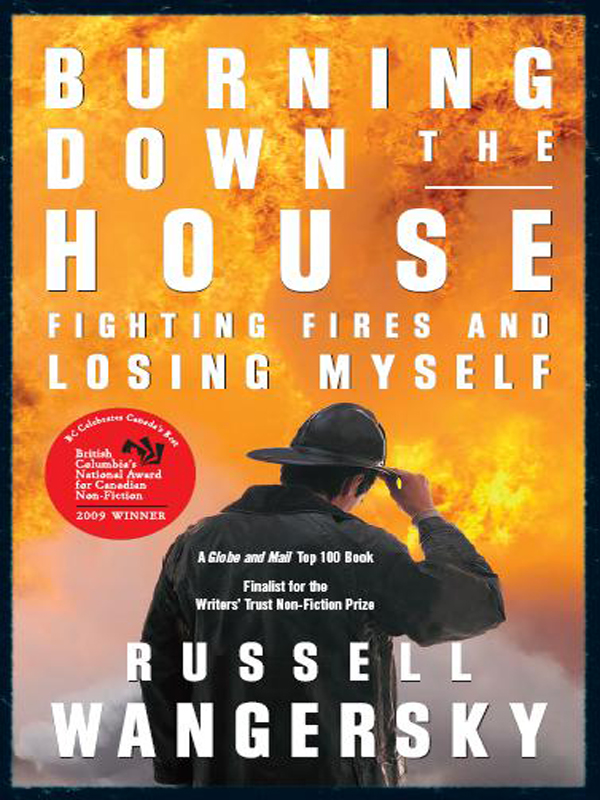Burning Down the House

Russell Wangersky
is a writer whose first collection of short stories,
The Hour of Bad Decisions
, was nominated for numerous awards including, most notably, the longlist for the 2006 Giller Prize and the shortlist for the 2006 Commonwealth Writer's Prize. The editor of
The Telegram
in St. John's, Newfoundland, his columns and editorials have appeared in newspapers across Canada.

Burning Down the House
ALSO BY RUSSELL WANGERSKY
The Hour of Bad Decisions
BURNING
DOWN
THE
HOUSE
Fighting Fires and Losing Myself
RUSSELL
WANGERSKY
Thomas Allen Publishers
Toronto
Copyright © 2008 by Russell Wangersky
First paperback edition copyright © 2009 by Russell Wangersky
All rights reserved. No part of this work may be reproduced or transmitted in any form or by any meansâgraphic, electronic, or mechanical, including photocopying, recording, taping, or information storage and retrieval systemsâwithout the prior written permission of the publisher, or in the case of photocopying or other reprographic copying, a licence from the Canadian Copyright Licensing Agency.
Library and Archives Canada Cataloguing in Publication
Wangersky, Russell, 1962â
Burning down the house : fighting fires and losing myself / Russell Wangersky.
ISBN 0-88762-329-8.
ISBN 978-0-88762-329-5 (bound).    ISBN 978-0-88762-410-0 (pbk.)
1.Wangersky, Russell, 1962â. 2. Volunteer fire fightersâCanadaâBiography.
3. First respondersâCanadaâBiography. 4. First respondersâPsychology.
5. First respondersâJob stress. I. Title.
TH9118.W35A3 2008Â Â Â Â Â 363.37092Â Â Â Â Â C2007-907557-6
Editor: Janice Zawerbny
Cover and text design: Gordon Robertson
Cover images: Veer
I have drawn extensively on two pieces of previously published material for this book: an essay of mine titled “Heroes” that was published in Ian Brown's
What I Meant to Say
, and “Mechanics of Injury,” which was published in
PRISM international
. Neither is included in its entirety here, but readers of either will recognize some of the situations involved. Astute readers may recognize details from two other pieces, “House of Dreams” and “Ways of Seeing,” which were also printed in
PRISM international
.
Published by Thomas Allen Publishers,
a division of Thomas Allen & Son Limited,
145 Front Street East, Suite 209,
Toronto, Ontario M5A 1E3 Canada

The publisher gratefully acknowledges the support of
The Ontario Arts Council for its publishing program.
We acknowledge the support of the Canada Council for the Arts, which
last year invested $20.1 million in writing and publishing throughout Canada.
We acknowledge the Government of Ontario through the
Ontario Media Development Corporation's Ontario Book Initiative.
We acknowledge the financial support of the Government of Canada through the Book
Publishing Industry Development Program (BPIDP) for our publishing activities.
13 12 11 10 09 1 2 3 4 5
Printed and bound in Canada
CONTENTS
I have seen people in their most unguarded momentsâwhere their family members have died, at accident scenes where the breadth of the destruction has already started to sink in but no one has any idea how long that destruction will last, and at fires where families have seen their homes and memories destroyed. I don't mean to trade on that, at least not by describing private individuals in anything close to identifiable detail. In fact, in some cases I have intentionally made it difficult to identify people, although I have stayed away from establishing composite or fictionalized characters: what happened is true, you just may not be able to find out who it actually happened to. And that's probably for the best.
A second thing: this book is based on the most malleable of thingsâmemory. My own memory, in fact. I didn't take notes during my years of firefighting because, first of all, I had not planned to write this and, secondly, there wouldn't have been time. Any mistakes or mistaken impressions are my own and should be seen in that light. There are hundreds of other versions of these same events, and they are equally true. By the time I was finished fighting fires, I had suffered a tremendous amount of psychological stress; it's quite possible that my memories are very different from the memories of other firefighters at the same scenes.
These are, warts and all,
my
experiences.
One small warning: firefighting is a graphic business, so some of the writing you will encounter in this book is explicit. It has not been written merely to shock; I could have written about much more shocking things. I have simply tried to describe events in the way they happened.
It may well be disturbing, and to a degree offensive. People who regularly face disturbing images have a blunt way of dealing with them, and often an offhand sense of humour that may seem unfeeling or hard-hearted. It is neither. More than anything else, it is a kind of coping mechanism.
I served in two very different volunteer fire departments: one in the Annapolis Valley town of Wolfville, Nova Scotia; and one in Portugal CoveâSt. Philip's, on Newfoundland's Avalon Peninsula. The first was a long-established fire department with an enviable and remarkable history; the other was brand new, started from the ground up. Both were departments that fought fires as well as responding to highway accidents and medical emergencies. One was a department where I dealt solely with strangers; in the second, the victims were occasionally acquaintances or friends. Both departments presented situations that were disturbing, albeit in different ways. Both were also extremely skilled, trained and professional, and if my house were burning or I were in a car accident, I would put my family and myself in their capable hands without a moment's hesitation.
There were many differences between the two departments, but at least two crucial things were the same: the incredible willingness of individuals to donate both their time and their hard physical work to help others, and the way that people who called either department had no choice but to allow us into the most frightening, embarrassing and emotional times of their lives.
If you recognize yourself in here, please trust that the recognition will only be clear to yourself and to others on the scene who already know about it anyway. Nothing in this book will let a neighbour or a stranger into your living room. I know what your hands look like in front of your face: I'm the only one who knows it was actually you. To those involved, I offer my apologies from the start for this intrusion.
No one asked me into their home or their personal disaster to do research for a book. I didn't ask for what I've gotten either, and that's more of what this book is meant to be about.
I would especially like to apologize to my ex-wife, Barbara Pratt. She, more than anyone, did not ask for this, or anything like this. Please keep in mind that this is just one side of a story. I have done what I can to preserve her privacy, but anyone who reads this should understand that her impression of the same events is likely much differentâand may well, in many ways, be more accurate.
I hope, in the end, that no one will feel I have taken advantage.
Firefighting was something I had dreamed of doing, something I had thought was an impossible goal. I was always small for my age and nearsighted to boot, not at all the physical type fire departments generally demand. I would watch the fire trucks passing the Halifax house where I grew up, and if the trucks stopped close enough and their sirens cut off I'd head out to hunt for the fire. I read books about firefighters, living vicariously through the words, sure that I would never be able to do that work myself.
As a result of chance and timing, I got to fight fires, and eventually both my size and my eyesight became their own kind of advantage. Small and light, I fit into many places where larger firefighters couldn't workâinside crushed cars, in confined spaces, in any spot where bulk hindered. My poor eyesight also had a peculiar benefit: while some people become claustrophobic in breathing gear and smoke, I was used to working without depending on my eyes. I was already accustomed to navigating by sound, to listening, to understanding that my eyes could lie.
Fighting fires and going to accident scenes is a sensory wonder, the most amazing and visceral experience anyone could ask for, but what had been a dream became a kind of personal nightmare, as bit by bit the underpinnings of wonder and heroics fell away. I was left with horrors I still live with now, horrors that can, occasionally, sneak up on me when I don't expect them, smashing my confidence and leaving me unable to control my temper or my fears.
At first I believed it would all be simple: people would call us, we would arrive on a scene with our training and our equipment, and we would help, because that was what we were supposed to do. The truth is infinitely more complicated than that, and helping sometimes ends up being far more subjective than it ever seems on paper.
I didn't actually help as much as I thought I would be able to. More than anything else, many actions were, in retrospect, best attempts and half measures. Bit by bit I realized that the heroic gloss of firefighting hidâat least for meâmore and more self-doubt with every passing fire and accident scene.
It wasn't that way at first. Only a few months into firefighting, I found myself in that very brief honeymoon where I actually believed I knew everything I needed to know. I believed that, between my equipment and the training, I had more than enough to keep myself safe. It's a feeling that would occasionally come back over the years I was fighting fires, but it was one that was always quickly dashed. Whenever you're up, there's going to be something to knock you down; you can do your best with physical safety, but you can't always deal with the rest. They don't make equipment to protect your mental health, although the fire service has gotten far better over the years at providing counselling and care for its members.
Each step into the fire service took me two steps farther away from everyone else's world, farther into a place that few people besides emergency workers will truly comprehend. I took every step wide-eyed with wonder, as careful as I could be not to break any unwritten code; firefighters have their own superstitions and fears, and it's easy, early on, to step into mistakes you know nothing about.